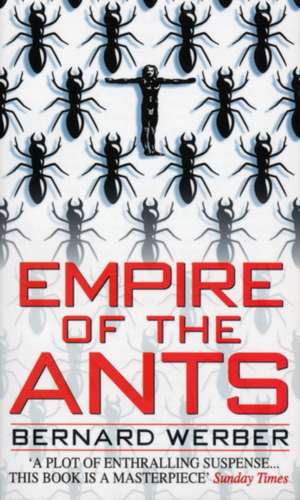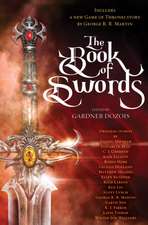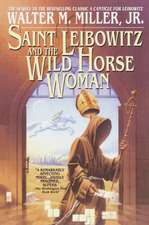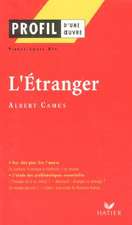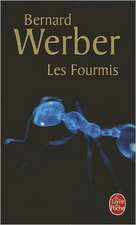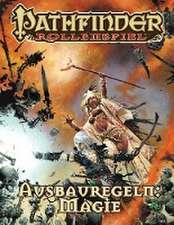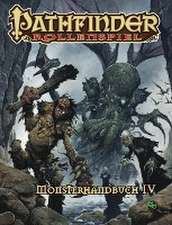Empire Of The Ants: Insecte
Autor Bernard Werber Traducere de Margaret Rocquesen Limba Engleză Paperback – 1997
| Toate formatele și edițiile | Preț | Express |
|---|---|---|
| Paperback (2) | 47.43 lei 3-5 săpt. | |
| Bantam – 31 ian 1999 | 47.43 lei 3-5 săpt. | |
| Transworld Publishers Ltd – 1997 | 57.30 lei 23-34 zile | +19.00 lei 6-10 zile |
Preț: 57.30 lei
Preț vechi: 69.10 lei
-17% Nou
10.96€ • 11.95$ • 9.24£
Carte disponibilă
Livrare economică 04-15 aprilie
Livrare express 18-22 martie pentru 28.99 lei
Specificații
ISBN-10: 0552141127
Pagini: 352
Dimensiuni: 106 x 177 x 27 mm
Greutate: 0.18 kg
Editura: Transworld Publishers Ltd
Seria Insecte
Notă biografică
Bernard Werber is a young scientific journalist who has studied ants for the last fifteen years. He lives in Paris. The sequel to Empire of the Ants, Le Jour des Fourmis, has already been published by Albin Michel.
Descriere
Ants came to this planet long before man. Since then they have developed one of the most intricate civilizations imaginable – a civilization of great richness and technological brilliance. During the few seconds it takes you to read this sentence, some 700 milli0on ants will be born on earth…
Edmond Wells had studied ants for years: he knew of the power which existed in their hidden world. On his death, he leaves his apartment to his nephew Jonathan with one proviso: that he must not descend beyond the cellar door. But when the family’s dog escapes down the cellar steps, Jonathan has little alternative but to follow. Innocently he enters the world of the ant, whose struggle for existence forces him to reassess man’s place in the cycle of nature. It is an experience that will alter his life for ever…
Empire of the Ants is an extraordinary achievement. It takes you inside the ants’ universe and reveals it to be a highly organised world, as complex and relentless as human society and even more brutal.
Recenzii
--The Sunday Times (London)
"A marvel of warped imagination and offbeat suspense."
--British Esquire
"Like Watership Down, to which it will inevitably be compared, Werber's astonishing first novel invites readers into a highly imagined animal world."
--Publishers Weekly(starred review)
From the Hardcover edition.
Extras
It was baking hot there, 38 C, as was only to be expected. The solarium faced due south to catch the heat of the sun for as long as possible. Sometimes, under the catalytic effect of the twigs, the temperature rose to as high as 50 C.
Hundreds of legs were busying themselves. Nurses, the most numerous caste here, were piling up the eggs Mother laid. Twenty-four piles formed a heap and twelve heaps made a row. The rows stretched away into the distance. When a cloud cast a shadow, the nurses moved the piles of eggs. The youngest had to be kept nice and warm. "Moist heat for eggs, dry heat for cocoons" was an old ant recipe for healthy babies.
On the left, workers responsible for maintaining the temperature were piling up pieces of black wood to accumulate heat and fermented humus to produce it. Thanks to these two "radiators," the solarium remained at a constant temperature of between 25 C and 40 C, even when it was only 15 C outside.
Gunners were patrolling the area. If a woodpecker messed with them, there'd be trouble. . . .
On the right were older eggs, further advanced in the long metamorphosis from egg to adult. With time and the nurses' licking, the little eggs grew bigger and turned yellow. After one to seven weeks, they turned into golden-haired larvae. That, too, depended on the weather.
The nurses were concentrating hard, sparing neither antibiotic saliva nor attention. Not a speck of dirt must be allowed to sully the larvae. They were so fragile. Even conversational pheromones were kept to a strict minimum.
Help me carry them into the corner...Look out, your pile's going to fall over...
A nurse was moving a larva twice her length, a gunner for sure. She put the "weapon" down in a corner and licked it.
At the center of this vast incubator were heaps of larvae on whose bodies the ten segments were beginning to show. They were howling to be fed, waving their heads and legs about and stretching their necks until the nurses let them have a little honeydew or insect meat.
After three weeks, when they had "matured" nicely, the larvae stopped eating and moving. They used this lethargic phase to prepare for the coming effort, gathering their energies to secrete the cocoons that would transform them into nymphs.
The nurses then carted the big bundles off to a nearby room filled with dry sand to absorb the moisture from the air. "Moist heat for eggs, dry heat for cocoons" could never be repeated often enough.
Inside this incubator, the cocoons turned from bluish-white to yellow to gray to brown, like the philosopher's stone but in reverse, while a miracle took place inside the shells. Everything changed, the nervous system, respiratory and digestive apparatus, sense organs and shell.
Once inside the incubator, the nymphs swelled within a few days as the eggs cooked and the big moment drew near. When a nymph was on the point of hatching, it was pulled aside, along with others in the same state. Nurses carefully pierced the veil of the cocoon, releasing an antenna or leg, until a kind of white ant was freed to tremble and sway. Its soft, clear chitin turned red after a few days, like that of all the Belokanians.
In the midst of this whirlwind of activity, 327th was unsure whom to address. He threw out a little scent to a nurse who was helping a newborn ant take its first steps.
Something serious is happening. The nurse did not even turn her head in his direction. She gave off a barely perceptible scent sentence:
Hush. Nothing is more serious than birth.
A gunner jostled him, hitting him gently with the clubs at the end of her antennae. Tap, tap, tap.
Stop bothering people. Move on.
His energy level was all wrong, the messages he emitted unconvincing. If only he had 56th's gift for communication! He tried again anyway with other nurses, but they ignored him completely. He ended up wondering whether his mission was really as important as he thought. Perhaps Mother had been right. Other tasks had priority. Perpetuating life rather than starting a war, for example.
While he was thinking this strange thought, a jet of formic acid grazed his antennae. A nurse had dropped the cocoon she was carrying and fired at him. Fortunately, she had not aimed properly.
He rushed to catch up with the terrorist but she had already darted off into the first nursery, knocking over a pile of eggs to block his way. The shells broke, letting out a transparent liquid.
She had destroyed some eggs! What had gotten into her? There was panic, with nurses running in all directions, anxious to protect the gestating generation.
Realizing he could not catch up with the fugitive, the 327th male tipped his abdomen under his thorax and took aim, but before he could fire she was struck down by a gunner who had seen her knock over the eggs.
A crowd formed around the charred body. When 327th bent his antennae over it, he was no longer in any doubt. It smelled of rock.
From the Hardcover edition.
